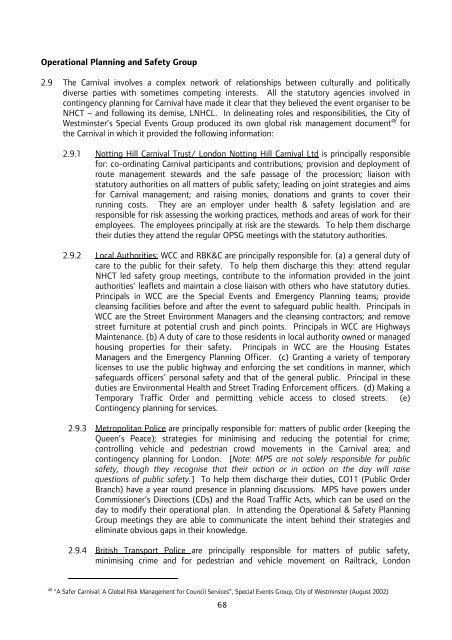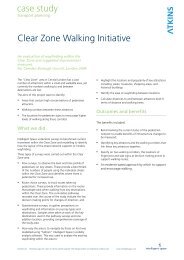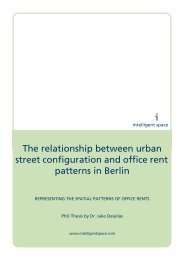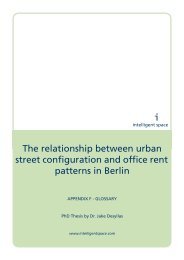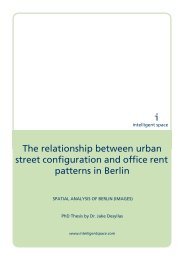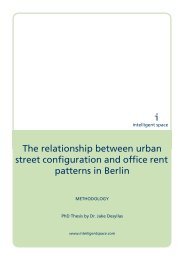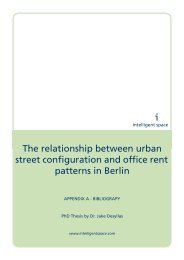Notting Hill Carnival Strategic Review - Intelligent Space
Notting Hill Carnival Strategic Review - Intelligent Space
Notting Hill Carnival Strategic Review - Intelligent Space
Create successful ePaper yourself
Turn your PDF publications into a flip-book with our unique Google optimized e-Paper software.
Operational Planning and Safety Group<br />
2.9 The <strong>Carnival</strong> involves a complex network of relationships between culturally and politically<br />
diverse parties with sometimes competing interests. All the statutory agencies involved in<br />
contingency planning for <strong>Carnival</strong> have made it clear that they believed the event organiser to be<br />
NHCT – and following its demise, LNHCL. In delineating roles and responsibilities, the City of<br />
Westminster’s Special Events Group produced its own global risk management document 48 for<br />
the <strong>Carnival</strong> in which it provided the following information:<br />
2.9.1 <strong>Notting</strong> <strong>Hill</strong> <strong>Carnival</strong> Trust/ London <strong>Notting</strong> <strong>Hill</strong> <strong>Carnival</strong> Ltd is principally responsible<br />
for: co-ordinating <strong>Carnival</strong> participants and contributions; provision and deployment of<br />
route management stewards and the safe passage of the procession; liaison with<br />
statutory authorities on all matters of public safety; leading on joint strategies and aims<br />
for <strong>Carnival</strong> management; and raising monies, donations and grants to cover their<br />
running costs. They are an employer under health & safety legislation and are<br />
responsible for risk assessing the working practices, methods and areas of work for their<br />
employees. The employees principally at risk are the stewards. To help them discharge<br />
their duties they attend the regular OPSG meetings with the statutory authorities.<br />
2.9.2 Local Authorities: WCC and RBK&C are principally responsible for. (a) a general duty of<br />
care to the public for their safety. To help them discharge this they: attend regular<br />
NHCT led safety group meetings, contribute to the information provided in the joint<br />
authorities’ leaflets and maintain a close liaison with others who have statutory duties.<br />
Principals in WCC are the Special Events and Emergency Planning teams; provide<br />
cleansing facilities before and after the event to safeguard public health. Principals in<br />
WCC are the Street Environment Managers and the cleansing contractors; and remove<br />
street furniture at potential crush and pinch points. Principals in WCC are Highways<br />
Maintenance. (b) A duty of care to those residents in local authority owned or managed<br />
housing properties for their safety. Principals in WCC are the Housing Estates<br />
Managers and the Emergency Planning Officer. (c) Granting a variety of temporary<br />
licenses to use the public highway and enforcing the set conditions in manner, which<br />
safeguards officers’ personal safety and that of the general public. Principal in these<br />
duties are Environmental Health and Street Trading Enforcement officers. (d) Making a<br />
Temporary Traffic Order and permitting vehicle access to closed streets. (e)<br />
Contingency planning for services.<br />
2.9.3 Metropolitan Police are principally responsible for: matters of public order (keeping the<br />
Queen’s Peace); strategies for minimising and reducing the potential for crime;<br />
controlling vehicle and pedestrian crowd movements in the <strong>Carnival</strong> area; and<br />
contingency planning for London. [Note: MPS are not solely responsible for public<br />
safety, though they recognise that their action or in action on the day will raise<br />
questions of public safety.] To help them discharge their duties, CO11 (Public Order<br />
Branch) have a year round presence in planning discussions. MPS have powers under<br />
Commissioner’s Directions (CDs) and the Road Traffic Acts, which can be used on the<br />
day to modify their operational plan. In attending the Operational & Safety Planning<br />
Group meetings they are able to communicate the intent behind their strategies and<br />
eliminate obvious gaps in their knowledge.<br />
2.9.4 British Transport Police are principally responsible for matters of public safety,<br />
minimising crime and for pedestrian and vehicle movement on Railtrack, London<br />
48<br />
“A Safer <strong>Carnival</strong>: A Global Risk Management for Council Services”, Special Events Group, City of Westminster (August 2002)<br />
68


